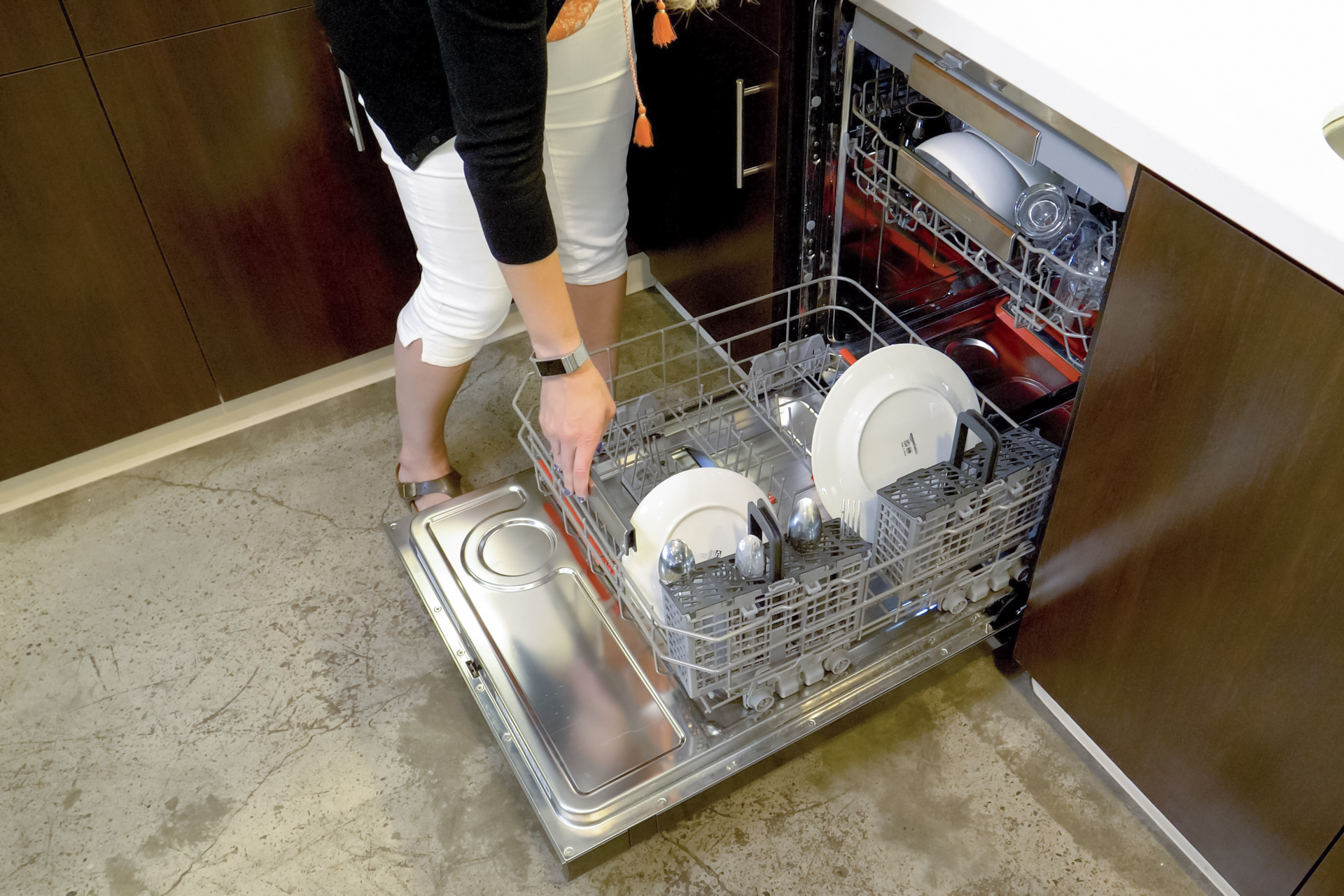A dishwasher is one of the hardest working appliances in the kitchen, so when it develops a problem, you notice very quickly. A typical dishwasher should last between seven and 12 years. However, dishwashers sometimes malfunction before that time period.
- Your dishes come out of the dishwasher dirty or covered in residue
- Your dishwasher leaks onto the floor
- Your dishwasher doesn’t dry your dishes
- Your dishwasher smells bad
- Your dishwasher doesn’t start
- Your dishwasher isn’t draining properly
- Your dishwasher creates an annoying film on glasses
- Your dishwasher starts making a lot of noise
- Your dishwasher doesn’t dispense soap
Getting a repair or replacement can be an expensive endeavor, so many people choose to do the repairs themselves. If your dishwasher is giving you problems, you may be able to give it some do-it-yourself love to fix the issue. We’ve compiled a list of some of the more common dishwasher problems and a few possible solutions to try.
For dishwashers more likely to last, you can also check out our guide for the best dishwashers you can buy.
Your dishes come out of the dishwasher dirty or covered in residue

First, check to make sure you’re not doing anything to cause the dishwasher to malfunction. Review the manufacturer’s recommendations on how to use and maintain your dishwasher. Are you overloading your machine? Could a utensil be restricting the spinning motion of the spray arms? Do you load plates in the machine without scraping food off of them first?
After you check to ensure you’re following the manufacturer’s recommendations, you can then check for problems with the machine itself. Check for any grease, debris, or blockages in the strain screen and door gasket. The culprit could also be your spray arms, so try to spin the bottom and top arms with your hand to make sure they spin easily. If neither do or if they’re covered in dirt or food debris, you may need to clean them. To do so, remove the arms and gently clean them with a toothbrush and a pipe-cleaner. Once replaced, try running a clean cycle to see if your dishes fare any better.
If your dishes come out covered in water spots, the water from the dishwasher may be staying on your dishes too long. A simple rinse aid may help to solve this problem. If your glasses and plates come out with a white residue on them, you may have hard water. Try using a water softener or a detergent that helps to soften your water.
Your dishwasher leaks onto the floor

First, check your dishwasher door and door gasket. Look for any cracks, damage, or large debris that could be preventing the door from sealing completely. Try cleaning your door gasket with a disinfectant, and if you see any large cracks, you will likely need to replace the gasket.
The float switch — the mechanism that indicates your dishwasher’s water level — may be stuck in the down position, according to Family Handy Man. This can cause your machine to overfill and leak onto the floor. If your float switch is stuck, clean it and remove any plastic, string, or anything else that might be preventing it from functioning properly.
Your dishwasher doesn’t dry your dishes

This is often a problem with the dishwasher’s heating element. If your heating element is in working order, check the high-limit thermostat (a device that prevents the dishwasher from getting too hot). According to Part Select, a malfunctioning high-limit thermostat can cause the heat to shut off before your dishes are fully dry. You can usually find your high limit thermostat at the bottom of the dishwasher tub, directly behind the access panel. You can use a multimeter to check the device. Lastly, check your rinse aid dispenser to make sure it’s not empty and that it’s dispensing properly. Without rinse aid, your dishes will not dry as easily.
Your dishwasher smells bad

Old, wet food is likely the cause of any bad smell coming from your dishwasher. Look through your machine carefully for any food, and clean your dishwasher’s screen (located at the bottom of your machine).
If your dishwasher has a chemical smell, a plastic plate or Tupperware container may have fallen down and melted onto the heating element. That said, it’s a good idea to load your dishwasher carefully and scrape your dishes to avoid unwanted odors.
Your dishwasher doesn’t start
Check the power sources to make sure you haven’t blown a fuse and ensure the outlet isn’t malfunctioning. You can even try power cycling the dishwasher.
Your dishwasher door may also be the problem. If it isn’t latched closed, for instance, it may not allow your dishwasher to start. That said, check for any problems with the latch before continuing.
If it sounds like your dishwasher is trying to work, but it just won’t run correctly, your motor may be stuck. If so, try spinning the fan motor by hand to see if that gets it moving. It’s important that you turn off the power using the main panel first, however, to avoid electrical shock.
Your dishwasher isn’t draining properly

This problem is obvious because your dishwasher floods the floor with water when you try to open it. First, try running your dishwasher a second time. A dishwasher that was unexpectedly turned off (say, by a brief power outage) could still have water inside because the cycle wasn’t complete. Simply running the cycle again can fix this problem.
You can also try running your garbage disposal. The dishwasher typically drains into the same drain the garbage disposal uses. If it is a problem with your disposal system, like built-up food sediment, this can prevent proper dishwasher drainage. If you just installed a new garbage disposal, the drain plug may still be in place, which means the dishwasher can’t access its drainage. Make sure the drain plug is removed and the dishwasher drain hose is properly connected if you have a new disposal system.
Your dishwasher creates an annoying film on glasses
Glassware film can be frustrating. It often occurs over time, and there’s not usually a quick fix for it. You might be surprised to learn that it might not be your dishwasher’s fault, but that of hard water. Hard water means that your town’s water possesses tiny minerals such as calcium and magnesium that precipitate out of hot water and attach to other surfaces, like glass. Fortunately, you can buy dishwasher detergents and additives that are designed especially for hard water.
Your dishwasher starts making a lot of noise

If your dishwasher is making odd noises, you need to check your dishwasher’s internal parts to figure out what’s wrong. For example, a bent wash arm can start making weird sounds. Seals and bearing rings that need replacing can also cause obnoxious rattling noises. If the culprit isn’t readily apparent, you might want to call a professional to look at your dishwasher’s pump and motor and troubleshoot the problem.
Your dishwasher doesn’t dispense soap
It’s annoying when you put powder or pod detergents in the compartment, and your dishwasher doesn’t dispense it. This may be due to a lack of water flowing into the compartment and dissolving and dispensing the soap. Try to use less detergent or use the liquid form. If you’ve tried this with no results, try checking the compartment itself, as it might not be opening correctly as the dishwasher runs. Examine the dishes’ position, as sometimes they can block the compartment from opening and releasing soap.
Editors' Recommendations
- The most common Echo Show problems and how to fix them
- How to fix the most common Blink Mini 2 problems
- How to install a Ring Video Doorbell at your home or office
- The best time to buy appliances (and the worst time to buy)
- Most common Amazon Echo Dot problems, and how to fix them


